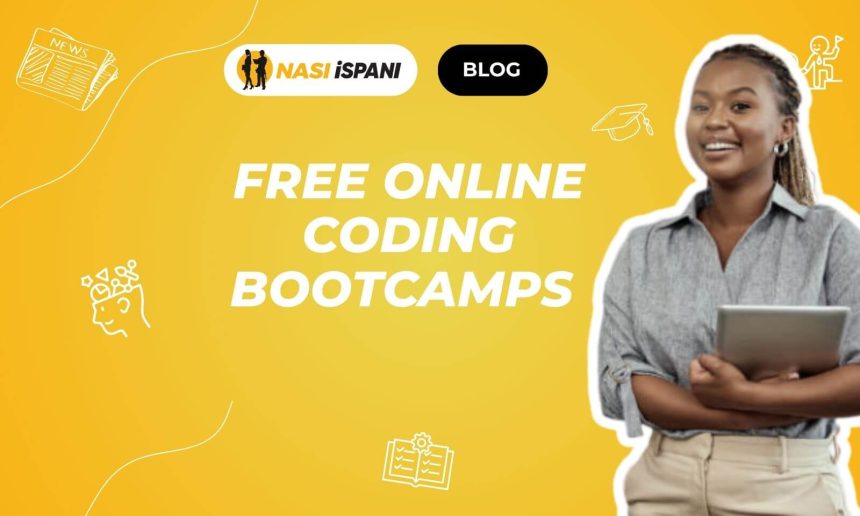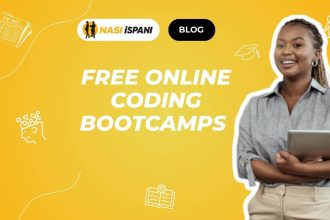Tech careers are booming in South Africa and globally, and the demand for coding skills has never been higher. But traditional coding bootcamps can be expensive, leaving many aspiring developers searching for accessible alternatives. That’s where online coding bootcamps come in; offering structured, project-based learning for free or at minimal cost.
Whether you’re a student in Johannesburg, a graduate in Cape Town, or someone anywhere in South Africa aiming to pivot into tech, this guide covers the best free online coding bootcamps, what they teach, and how to pick the right one for your goals.
Why Free Online Coding Bootcamps Are Worth Exploring
Online coding bootcamps bridge the gap between self-study and formal education. Unlike university degrees, which focus on theory, bootcamps are practical and outcomes-driven; designed to get learners job-ready fast.
Key Benefits
- Accessibility:
You can start learning anywhere in South Africa — whether in Soweto, Polokwane, or Durban — using only an internet connection and a laptop. - Affordability:
Free bootcamps remove financial barriers, allowing anyone to explore programming before committing to paid specializations or advanced certifications. - Career Relevance:
These bootcamps teach in-demand languages and frameworks like Python, JavaScript, React, SQL, and HTML/CSS, aligning directly with employer needs. - Portfolio Building:
Most platforms emphasize real-world projects you can upload to GitHub or personal portfolios, proving your practical ability. - Community and Mentorship:
Even free bootcamps offer access to online communities, forums, and study groups where you can learn alongside others.
A Realistic Perspective
While free coding bootcamps don’t always offer personal career coaching or job guarantees, they are a powerful entry point for self-motivated learners. In 2025, employers care less about degrees and more about demonstrable skill — meaning a well-documented GitHub portfolio can carry as much weight as a certificate.
Learn more: Free Online Workshops to Boost Employability Before 2026
Top Free Online Coding Bootcamps
Below is an in-depth look at the best online coding bootcamps that are free, globally recognized, and ideal for South Africans looking to build a career in tech.
1. freeCodeCamp
Overview:
freeCodeCamp is arguably the most comprehensive free bootcamp in the world, trusted by over 50 million learners. It’s completely nonprofit, self-paced, and focused on helping students learn to code through real-world projects.
Languages & Tech Stacks:
- HTML5, CSS3, JavaScript
- React, Node.js, Express, MongoDB
- Python for data analysis and machine learning
- Git & GitHub integration
What You’ll Learn:
freeCodeCamp’s curriculum includes over 8,000 lessons and six professional certifications, covering:
- Responsive Web Design
- JavaScript Algorithms and Data Structures
- Front-End Development Libraries (React, Redux)
- APIs and Back-End Development
- Data Visualization
- Machine Learning with Python
Unique Features:
- 100% free and browser-based — no installations needed.
- Project-based learning: you build and deploy live projects.
- Recognized certificates that employers respect.
- Active community with forums, chat rooms, and mentorship channels.
Who It’s Best For:
Beginners or career changers seeking a complete, structured learning path toward full-stack web development.
2. The Odin Project
Overview:
Created by an open-source community and maintained by volunteer developers, The Odin Project (TOP) focuses on full-stack web development with an emphasis on practical, real-world application.
Languages & Tech Stacks:
- HTML, CSS, JavaScript
- Git, Node.js, Ruby, and React
What You’ll Learn:
TOP’s two main learning paths are:
- Foundations: Basic web development skills, HTML/CSS, JavaScript essentials, and command-line tools.
- Full-Stack JavaScript: Advanced front-end and back-end development using Node.js, Express, and React.
Unique Features:
- Highly structured curriculum that simulates the workflow of real developers.
- Collaborative projects encourage teamwork and communication skills.
- Integration with GitHub to document your progress and projects.
Who It’s Best For:
Learners who prefer clear structure and accountability, and who want to build production-grade web applications.
Success Story:
3. CS50 by Harvard (edX)
Overview:
Harvard’s CS50 is one of the most respected computer science introductions globally, offering a free, university-level education in coding fundamentals. It’s hosted on edX, making it accessible to anyone with an internet connection.
Languages & Tech Stacks:
- C, Python, SQL, HTML, CSS, JavaScript
What You’ll Learn:
- Computer science theory and problem-solving
- Data structures and algorithms
- Web and software development basics
- Memory management and debugging
Unique Features:
- Taught by world-renowned professor David J. Malan.
- High-quality lectures, problem sets, and projects.
- Optional verified certificates (financial aid available).
- A gateway into advanced topics like Artificial Intelligence (CS50AI) and Web Programming (CS50W).
Who It’s Best For:
Learners who want an academic foundation in computer science before specializing in web or software development.
Success Story:
4. MIT OpenCourseWare – Computer Science
Overview:
MIT’s OpenCourseWare provides free access to its computer science curriculum, including full lecture notes, video lectures, and assignments.
Languages & Tech Stacks:
- Python, Java, C
- Algorithms, Data Structures, Machine Learning
What You’ll Learn:
Courses like “Introduction to Computer Science and Programming Using Python” teach computational thinking and software engineering skills.
Unique Features:
- No registration or deadlines — fully self-paced.
- Taught by MIT professors using official course material.
- Ideal for learners pursuing an academic, research-driven understanding of programming.
Who It’s Best For:
Highly self-motivated learners or those considering formal computer science study later.
Success Story:
MIT OCW has helped thousands of learners worldwide transition into data analysis, academic research, and technical development roles.
5. Codecademy (Free Tier)
Overview:
Codecademy is one of the most interactive online coding bootcamps, offering free beginner-friendly courses that introduce learners to the basics of coding through gamified exercises.
Languages & Tech Stacks:
- HTML, CSS, JavaScript, Python, SQL, Git
What You’ll Learn:
Free modules include:
- Learn HTML & CSS
- Learn JavaScript
- Learn Python 3
- Command Line and Git basics
Unique Features:
- Real-time code editor with instant feedback.
- Simple progression system to track your learning milestones.
- Paid Pro tier unlocks advanced career paths and certificates, but free courses are a solid foundation.
Who It’s Best For:
Absolute beginners who enjoy interactive, game-like learning experiences.
Success Story:
Many use Codecademy to master programming fundamentals before advancing to The Odin Project or freeCodeCamp.
6. Scrimba
Overview:
Scrimba offers an innovative approach to online coding — interactive screencasts that let you edit the instructor’s code directly in the lesson.
Languages & Tech Stacks:
- HTML, CSS, JavaScript, React
What You’ll Learn:
Free courses include:
- Front-End Developer Career Path (preview available)
- Learn JavaScript for Free
- Build Responsive Websites with HTML and CSS
Unique Features:
- Highly interactive: you can pause a video and change the code in real time.
- Great for visual learners who prefer “learning by doing.”
- Supportive community with free access to study groups and developer challenges.
Who It’s Best For:
Visual and interactive learners who want to focus on front-end or web app development.
Success Story:
Many Scrimba learners land freelance front-end developer gigs after completing projects showcased in their portfolios.
7. Google Career Certificates
Overview:
Google Career Certificates are professional-level programs covering IT support, data analytics, UX design, and Python-based automation. Many learners can access them for free through scholarships or financial aid on Coursera.
Languages & Tech Stacks:
- Python, SQL, Google Sheets, Google Cloud Tools
What You’ll Learn:
Depending on your path, you can specialize in:
- Data Analytics (Python, spreadsheets, SQL, dashboards)
- IT Support (networking, cybersecurity fundamentals)
- Project Management or UX Design
Unique Features:
- Developed and endorsed by Google.
- Practical projects and job-ready portfolio tasks.
- Access to employer consortiums for job opportunities.
Who It’s Best For:
Career changers and professionals seeking recognized, industry-aligned certificates without formal degrees.
Success Story:
Google reports that over 75% of graduates in the U.S. report a positive career outcome (new job or promotion) within six months.
How to Choose the Right Online Coding Bootcamp
When selecting an online coding bootcamp, consider the following:
- Learning Style:
- Self-paced learners thrive in freeCodeCamp, MIT OCW, and Codecademy.
- Structured learners may prefer CS50 or Google Certificates with set milestones.
- Career Goals:
- Front-End Development: Scrimba, The Odin Project, Codecademy.
- Full-Stack Development: freeCodeCamp, The Odin Project.
- Data or Python Programming: Google Certificates, MIT OCW, CS50.
- Time Commitment:
Most bootcamps require 5–20 hours per week. Focus on consistency, coding daily builds stronger habits than weekend cramming. - Portfolio Opportunities:
Choose bootcamps emphasizing projects you can showcase on GitHub or LinkedIn. - Community and Support:
Peer-to-peer learning boosts motivation and accountability. Look for active forums, Discord channels, or local meetups.
Success Tips for Learning to Code for Free
- Set a Routine: Allocate daily study time, even one hour a day compounds quickly.
- Join Coding Communities: Reddit’s r/learnprogramming, Discord servers, and GitHub offer free support and networking.
- Start Building Projects: From calculators to personal blogs, practice what you learn.
- Document Progress: Keep a portfolio or blog to track your journey and attract employers.
- Leverage Free Tools: Platforms like W3Schools, MDN Web Docs, and YouTube tutorials supplement structured bootcamps.
Frequently Asked Questions (FAQs) About Online Coding Bootcamps
1. What is an online coding bootcamp?
An online coding bootcamp is a structured, intensive training program that teaches coding and web development skills through interactive lessons, projects, and mentorship; all delivered online. These bootcamps are designed to help learners gain practical, job-ready skills in areas such as web development, data science, or software engineering in a short period.
2. Are online coding bootcamps really free?
Yes, many online coding bootcamps offer free access to their learning materials, projects, and communities. Platforms like freeCodeCamp, The Odin Project, and CS50 by Harvard are 100% free. However, some platforms like Codecademy or Coursera have both free and paid options the free version usually excludes certificates or mentorship.
3. Can I get a job after completing a free online coding bootcamp?
Absolutely, many learners have transitioned into tech roles after completing free bootcamps. Employers increasingly value hands-on experience and portfolio projects over degrees. If you build a strong GitHub profile and complete real-world projects through platforms like freeCodeCamp or The Odin Project, you’ll have job-ready skills to show recruiters.
4. Which free online coding bootcamp is best for beginners?
For complete beginners, freeCodeCamp and The Odin Project are excellent starting points. They both offer step-by-step learning paths in web development, covering HTML, CSS, JavaScript, and backend frameworks with built-in projects to reinforce learning.
5. Do online coding bootcamps provide certificates?
Yes, some do. For instance, freeCodeCamp issues verified certificates upon completing each module. Google Career Certificates (via Coursera) and CS50 by Harvard also provide recognized certificates that can be showcased on your LinkedIn profile or resume.
6. How long does it take to complete an online coding bootcamp?
The duration depends on your pace and the program’s structure.
- Self-paced bootcamps like The Odin Project can take 6–12 months.
- Structured courses like Harvard’s CS50 or Google Certificates typically last 3–6 months if studied part-time.
Most learners progress faster with consistent daily study (1–2 hours a day).
7. What programming languages will I learn?
The most common languages taught in online coding bootcamps include:
- HTML, CSS, JavaScript (front-end development)
- Python, Java, or Ruby (back-end development)
- SQL for databases
- React or Node.js for full-stack development
Some advanced courses cover data science, machine learning, and DevOps fundamentals.
8. Are free bootcamps as good as paid ones?
Free bootcamps can be just as effective; the key difference lies in the level of support. Paid programs often offer one-on-one mentorship or job placement assistance. Free options like freeCodeCamp and The Odin Project make up for this by offering large, supportive communities, project-based learning, and open-source collaboration.
9. Can I learn coding while working full-time?
Yes! Most free online coding bootcamps are self-paced, allowing you to study at your convenience. Many learners dedicate evenings or weekends to study. Platforms like Scrimba and Codecademy even offer bite-sized lessons you can complete in under 30 minutes a day.
10. Do I need a computer science degree to join a coding bootcamp?
Not at all. Online coding bootcamps are designed for people from all backgrounds — whether you’re a student, job seeker, or career changer. You just need a reliable computer, internet connection, and commitment to consistent learning.
11. Can I build a real portfolio from these bootcamps?
Definitely. Platforms like freeCodeCamp and The Odin Project require learners to complete real-world projects such as websites, apps, or APIs. These can be uploaded to GitHub to form a professional portfolio; an essential step for job applications.
12. Do employers recognize free online coding bootcamps?
Yes, many employers recognize bootcamps that focus on project-based learning and modern tech stacks. While certificates help, what matters most is your ability to demonstrate skills showing projects, code repositories, and problem-solving capabilities.
13. How do I choose the right online coding bootcamp for me?
Consider the following:
- Your career goal (web development, data analysis, software engineering, etc.)
- The structure (self-paced vs. instructor-led)
- The tech stack (JavaScript, Python, etc.)
- Availability of community support or mentorship
Research reviews and learner experiences before committing to one platform.
14. Are there any free online coding bootcamps with job guarantees?
Free programs typically don’t offer job guarantees, but some provide career prep support. For example, Google Career Certificates offer pathways into partner companies, and Coursera courses often include professional development content.
15. What’s the best way to stay motivated while learning to code?
Here’s what works for most learners:
- Set a daily or weekly schedule.
- Join communities on Reddit, Discord, or freeCodeCamp forums.
- Track your progress on GitHub.
- Start small: build mini projects to apply what you learn.
- Celebrate milestones; every completed project is progress toward a new career.
The tech industry offers boundless opportunities and online coding bootcamps make those opportunities accessible to everyone. Whether you’re starting out or reinventing your career, you can now learn in-demand programming skills, build professional projects, and earn respected certificates without financial stress.
Start with one of these free bootcamps, set a learning schedule, and begin building your portfolio. Remember: the first line of code is the hardest but it’s also the beginning of something powerful.



